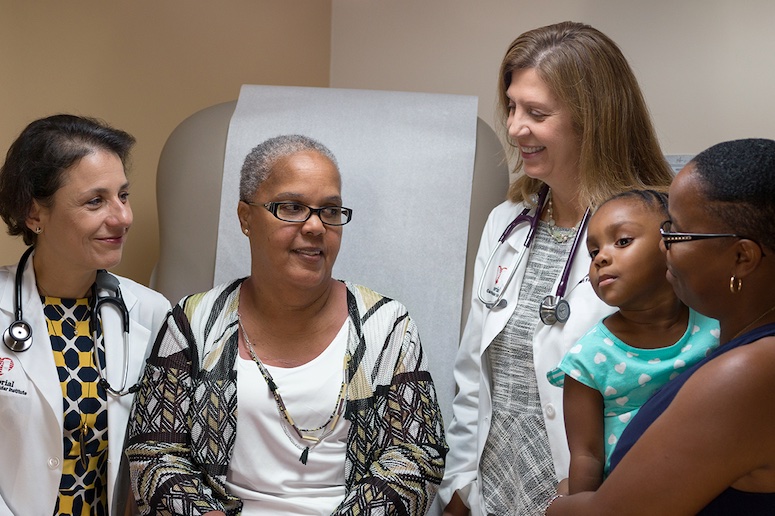What to Expect with Thoracic Surgery
Memorial’s expert thoracic surgeons and nurses are here to help you understand what to expect before and after your procedure.
Memorial’s expert thoracic surgeons and nurses are here to help you understand what to expect before and after your procedure.
If you have any concerns or issues during your recovery, contact us. Our team is ready to provide prompt care.
954-265-1125 Memorial MyChartBefore you have thoracic surgery, it’s important to understand the benefits, risks and expectations. You also need clear guidance on ways to enhance your recovery. Memorial’s thoracic surgery team focuses on you and your family, taking the time to explain the details of your procedure and address any concerns you may have.
We will see you twice daily throughout your stay or more often if needed. Before you go home, we provide detailed discharge instructions, explain what to look for and answer all your questions.
Once you’re home, you can reach us by phone with any questions. You can also communicate with your surgeon and nurses, manage follow-up appointments and more at Memorial MyChart. You will see your surgeon for an initial follow-up visit about two to three weeks after discharge, or sooner if necessary.
Your Thoracic Surgery Team
In addition to your thoracic surgeon and nurses, your team includes:
- Case managers and social workers, who can help make arrangements for you to go home. They assist if you need tube feedings, special equipment, supplies or home nursing.
- Dietitians, who educate you about ways to maximize your diet to lessen symptoms.
- Our mobility team to help you move around after surgery.
- Pharmacists to help you manage pain and teach you how to take your medications safely.
What to Expect Before Thoracic Surgery
In addition to your surgeon’s instructions, the following preoperative steps will help you prepare for surgery and recover safely:
- Eat anything starting at midnight on the day of surgery. This includes ice, gum and candy. You can brush your teeth but don’t swallow any water.
- Take any aspirin, Motrin, Aleve, Excedrin, ibuprofen or blood thinners for a week before surgery. Your surgeon or another specialist may give you specific instructions about your medications.
- Consume any vitamin E supplements, herbal medications, fish oil or diet pills.
- Use any lotions or deodorants on the day of surgery.
- Bring personal or valuable items to the hospital or clinic.
- Use an antimicrobial cleanser on your skin (such as Hibiclens) before your procedure, as instructed by your surgeon.
- Drink clear liquids, as instructed by your anesthesiologist. At bedtime the night before your surgery or at midnight, drink 16 ounces of Gatorade or Powerade (any color but red). One hour before you report for surgery, drink 12 ounces of Gatorade or Powerade (again, not red). After these beverages, don’t drink anything else.
- Take your medications that have been cleared by the anesthesiologist.
- Tell the surgical team if you develop any signs of illness, such as a sore throat, fever or rash before surgery.
- Wear casual, loose-fitting, comfortable clothing.
- Legal guardianship papers or court orders, if applicable
- Copy of your living will and advance directives
- Photo ID, insurance card, and co-pay, if applicable
- Someone to drive you home if you are going home the same day. You will not be allowed to drive yourself or take public transportation without an escort.
Each person’s experience with surgery is different. But these general guidelines will help you understand how to care for yourself after surgery.
- Begin to eat and drink normally when you feel ready.
- Avoid lifting anything heavier than 10 pounds.
- Attend your follow-up appointment, usually two to four weeks later.
- Take all your medications according to your doctor’s instructions.
- Shower a day or two after surgery, using mild soap and water. Pat incisions dry lightly with a towel.
- Avoid soaking in water, including baths, pools and hot tubs.
Call your surgical team if you experience:
- Fever higher than 101 degrees Fahrenheit
- Shortness of breath
- Redness around the incision
- Fluid draining from your incision that is yellowish, greenish or foul-smelling
Your surgical team will teach you how to care for any drains or incisions. We’ll also provide medications to help you manage pain. These medications may cause constipation, which can be relieved with more fluid intake, fiber, laxatives and stool softeners.
If you have any concerns or issues during your recovery, contact us. Our team is ready to provide prompt care.
954-265-1125 Memorial MyChart
Visitor Policies
The facility is open 24 hours a day. We ask visitors to follow and guidelines below.
